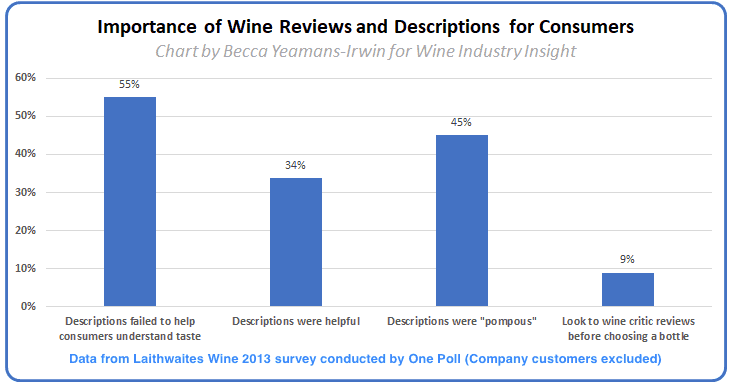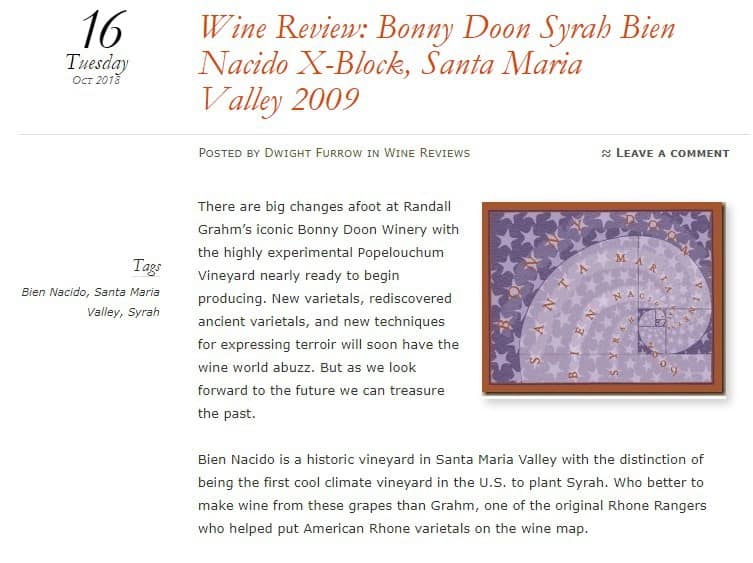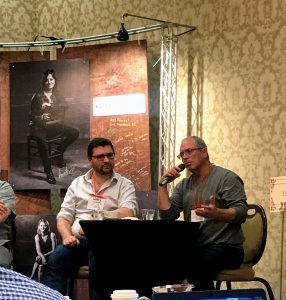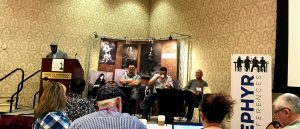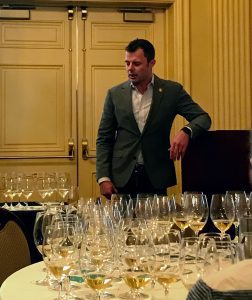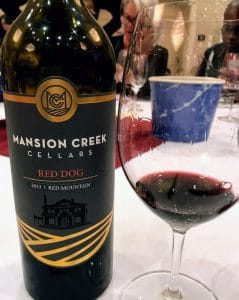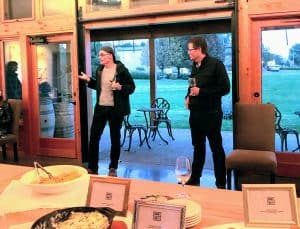In my early Twitter days, I would pretty much follow anyone with “wine” in their bio–wineries, writers, news sites and other personalities. But I’ve gotten far more selective over the years as I started to view my Twitter feed as a tool.

I’m on here nearly every day looking for new content to devour. Above all, I want to find engaging conversations that encourage me to think more deeply about my sentiments on wine. Admittedly, I don’t always find that amidst the noise and other rubbish that can populate the site.
However, in the waning hours of International Women’s Day, I wanted to highlight the accounts that are written by women which do provide me the intriguing content and conversations I crave.
While this may appear to be fairly exhaustive, it’s far from it. I created a list on the SpitBucket Twitter page titled “Women Wine Twitter” which features many more accounts.
I’m always looking to add more so if you know of someone that I missed, add their names in the comments below.
Rules for Inclusion
The women listed below are accounts that I follow myself. As I noted above, I try to be somewhat selective in my follows. My criteria for following is dependent on an account being active, engaging and mostly wine focused.
I understand how outside life can get in the way. But I have little interest in following an account that only tweets once or twice a month if that. Even more important than activity, though, is the quality of the content. I want to get something out of the accounts I follow–whether that be learning something new about wine, an inspiration for a post or a reason to think about things in a different way.
All of the accounts listed below deliver on those criteria and are well worth following.
Masters of Wine and Master Sommeliers
Sadly not too many Masters of Wine and Master Sommeliers are really active on Twitter. Quite a few fall into the “tweet every once in a while” mindset and it seems like most Master Sommeliers have migrated over to Instagram.
But the ones below are a few notable exceptions that I’ve found.
Jancis Robinson (@JancisRobinson)
The Beyoncé of Wine. Need I say more?
Sarah Abbott (@SarahAbbottMW)
Sarah is a Master of Wine who posts reasonably regularly about various tastings she’s attending, MW affairs, timely news articles as well as posts from her Swirl Wine Group blog.
Jennifer Simonetti-Bryan MW (@JediWineMaster)
By far, the coolest wine name on Twitter. And it’s a moniker that Simonetti-Bryan certainly lives up to as evidenced by her tweets and fabulous Rosé Wine wine book (which I reviewed here).
Elizabeth Gabay MW (@LizGabayMW)
One of the foremost authorities on rosé wine, I also get quite a bit of insight into the European market and politics from following her Twitter feed. Recently, she was in the Canary Islands where she posted a great pic of the many old-school styles of vine trellising still used on the Spanish islands.
Debra Meiburg MW (@DebraMeiburgMW)
Debra is an Asian-based Master of Wine who comments on various aspects of the wine industry. Her Twitter feed is always an excellent source for keen insights such as the quotes she pulled from Laura Catena’s recent seminar in Hong King.

Jeannie Cho Lee
Jeannie Cho Lee MW (@JeannieChoLee)
The first Asian Master of Wine, Jeannie is a frequent contributor to Decanter and the Robb Report. While her Twitter feed has its fair share of bottle porn, I appreciate that she adds some context and details to describe all the fabulous wine she is drinking. It’s always nice to know that your sentiment on Cristal is shared by a Master of Wine.
Pascaline Lepeltier (@plepeltier)
Along with Alice Feiring, Pascaline authored the Dirty Guide to Wine and is a big advocate of Natural Wine. She is also an evangelist for the wines of her native Loire Valley including the incredibly underrated Chenin blanc grape. Bringing more attention to Chenin is a mission that I can certainly get behind!
Wine Business and Marketing Mavens
Rebecca Hopkins (@beckhopkinswine)
Rebecca is a long time industry vet who frequently comments and retweets articles about important happenings in the industry. A native Australian, she’ll often tweet about some of the silly ways that Australian wines and other beverages are marketed.
Cathy Huyghe (@cathyhuyghe)
The co-founder of Enolytics, many of Cathy’s tweets (as well as her articles for Forbes and other publication) are business and data-driven. I particularly like the way that she tends to cut through the noise to show unique perspectives about hot-button wine topics such as her post in January about diversity in the wine business.
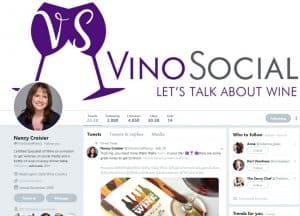
Screenshot of Nancy Croiser’s Vino Social Twitter page.
Nancy Croisier (@VinoSocialNancy)
Nancy is a long time marketing specialist who runs Vino Social which helps wineries better utilize social media. Her mission is one close to my heart and such a vital component in regaining the lost storytelling of wine. Needless to say, her Twitter feed is a master class in savvy social media use and is well worth following for anyone in the wine business.
Jessyca Lewis (@JessycaLewis)
Jessyca is a wine educator with a business and marketing focus. Every other Monday she hosts interviews and moderates conversations about wine marketing topics under the #winemktmonday hashtag. For anyone wanting to learn more about the business, particularly in the US, this is a must-follow.
Polly Hammond (@mme_hammond)
Along with Reka Haros and Felicity Carter (mentioned below), Polly usually gets tagged and contributes to really informative and interesting wine conversations on Twitter. It makes sense way given her background in the marketing world running 5forests in New Zealand.
Melanie Ofenloch (@dallaswinechick)
A professional marketing consultant in the Dallas area, Melanie is a fixture at many tasting events where she interacts with industry folks such as Anne Bousquet from Domaine Bousquet. Her Twitter feed features a lot of pics and her thoughts from these events as well as useful retweets of interesting wine articles.
Brilliant Women Winemakers and Winery Owners
Reka Haros (@RekaHaros)
Reka owns Sfriso Winery with her husband in the Treviso region of Venice. But she has a background in marketing and advertising which gives her great insights as well. She contributes to some of the best Twitter convos happening in the wine industry (IMO). Like this recent thread about a Harvard Business Review article on wine consumers that was stirring up controversy.
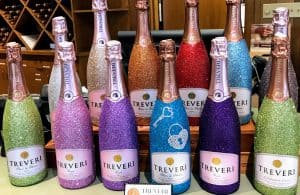
Don’t be misled by the bling display bottles, there is some seriously good sparkling wine being made here.
Julie Grieb (@cuveetirage)
Julie owns the Washington State sparkling wine producer Treveri with her husband and is an alum of Sonoma University Wine Business Management program. While a lot of her tweets, understandably, focus on sparkling wine (including highlighting the super cool single-vineyard Pinot Meunier bottling from Alfred Gratien) she also participates in a lot of fun win convos.
WOWSonoma (@wowsonoma)
This Twitter account highlights women-owned wineries in Sonoma. But their tweets often extend beyond Sonoma including a directory of women-owned wineries across the US.
Sarah Garrett (@SerranoWine)
I’ve mentioned Sarah on the blog before because of her skillful marketing to Millennials. Together with her husband Brice, they run a winery down in Paso Robles that specializes in Rhone varieties. Their Twitter feed gives great behind-the-scenes insights into all the hard work that goes into maintaining a vineyard and running a winery.
Lori Budd (@Dracaenawines)
With her husband Michael, Lori runs Dracaena Wines in Paso Robles. While their wines have won many awards, so has her blog which has expanded to a podcast that features interviews with winemakers and other industry folks. She was also the spark plug behind the development of Cabernet Franc Day.
Elizabeth Vianna (@ChimneyRockWine)
I may get an opportunity to meet Elizabeth in early May when I do an interview tour with producers of the Stags Leap District AVA. I’ll be completely honest; it will be tough not to fangirl out if that happens. She is such a tremendous winemaker who injects a lot of personality into her wines that can also be seen on her twitter feed like in this behind-the-scenes post from a UC-Davis seminar conducted by Dr. Linda Bisson (another rockstar).
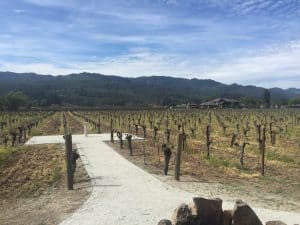
The Kronos vineyard outside Corison’s tasting room in St. Helena.
Cathy Corison (@cathycorison)
So I actually did fangirl out when I met Cathy. I couldn’t help it. She is such a legend in the industry and one of the kindest, most humble voices you will ever meet. Her feed is not only worth following for her insights but also links to great articles like this write-up on Elaine Chukan Brown (a marvelous wine writer worth following as well @hawk_wakawaka).
Amelia Ceja (@AmeliaCeja)
Pioneering owner of the Napa Valley winery Ceja in Carneros. She is the first and only Mexican-American woman to own a winery, earning honors at the Smithsonian.
Good Sources For Wine News and Other Perspectives
Anyone that follows the SpitBucket Facebook page knows that I’m a news junkie. If you’ve ever wondered where I get many of the articles I post and comment on, it’s from the feeds of these ladies below.
Esther Mobley (@Esther_mobley)
As the wine critic for the San Francisco Chronicle, Esther holds a lot of sway in the California wine industry. But what I love is that she doesn’t lord over her domain with a pen but instead looks for the humanity behind each story such as her incredibly thought-provoking piece on migrant female workers’ role in the California wine industry. More recently, she wrote a very touching tribute to the late Stags Leap District icon, John Shafer.
Jane Anson (@newbordeaux)
Jane is the lead Bordeaux writer for Decanter and, frankly, I think she is the best Bordeaux reviewer currently in the business. When I was reviewing Bordeaux Futures offers for the 2017 campaign, I found her detailed reports and honest assessment of this uneven vintage to be the most informative and useful. While there are a lot of great writers on Bordeaux, if you want to only follow one–follow Jane.
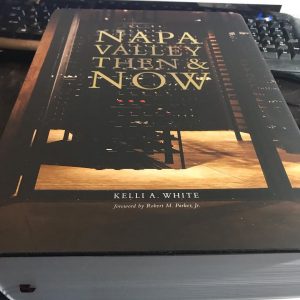
My Christmas present last year was Kelli White’s 1255 page tome on Napa Valley. It’s a beauty!
Kelli Audrey White (@kelliwhitewine)
One of the lead writers on GuildSomm, her articles are can’t miss reads. The amount of background research and details that she puts into her work is inspirational. Simply put, I want to be Kelli White when I grow up.
Felicity Carter (@FelicityCarter)
The editor-in-chief of Meininger’s Wine Business International, Felicity Carter is one of the most influential women in wine. I can only imagine how jammed pack her schedule must be but she still manages to find time to contribute to many thoroughly engaging wine conversations on Twitter. In fact, it was one of her tweets that inspired my Wine & Politics — Strange Bedfellows or Drinking Buddies? post.
Becca Yeamans-Irwin (@TheAcademicWino)
Along with Lewis Perdue, Becca curates the daily wine news fetch for Wine Business Insight. On her blog, her posts aptly take an academic bent focusing on scientific studies and literature related to the beverage industry–such as this review of social media use on Facebook by wineries in Sicily.
Dorothy J. Gaiter (@winecouple)
With her husband, John Brecher, Dottie wrote the Wall Street Journal’s wine column for 12 years and is still producing outstanding content on her Grape Collective site. She also pioneered “Open That Bottle Night” which has even been immortalized on Jeopardy!
Jill Barth (@jillbarth)
Jill’s work is featured in Wine Enthusiast, Decanter, Forbes and USA Today. Her Twitter feed is a smorgasbord of highly informative news articles from many different sources–as well as many different topics like this uber geeky piece on the genetic history of yeast strains used in beer.
Michelle Williams (@Fiery01Red)
In addition to her Rockin Red Blog, Michelle also writes for Snooth, Forbes and other publications. Like most great writers, her Twitter feed is very well-curated with links and retweets to many interesting articles as well as her own work.
Liza Zimmerman (@LizaWineChick)
A longtime writer and wine educator, Liza brings a wealth of experience and insight to her writings. On sites like WineSearcher.com and Forbes, she often gets inside scoops and valuable interviews on leading wine topics–like the recent MS scandal.
Lauren Mowery (@chasingthevine)
Lauren is an MW student who also contributes to Wine Enthusiast, USA Today, Forbes and other publications. You’ll often find her posts being retweeted and circulated around the Twitter-sphere. Among her many great articles was this recent interview with Nicole Salengo, winemaker for Berryessa Gap Vineyards.
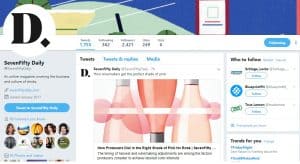
I’m shocked at how few people are following Seven Fifty Daily’s Twitter feed right now.
There is some seriously good stuff being published here.
Katherine Cole (@kcoleuncorked)
A leading voice on Seven Fifty Daily, Katherine wrote a tremendous piece on legendary French wine importer Martine Saunier that is a must read any time of the year. But it particularly fits for Women’s History Month. Seven Fifty Daily is becoming one of the top resources for compelling content and Katherine (along with editor-in-chief Erica Duecy @ericaduecy) is a big reason why.
Wine Bloggers/Media Conference Discoveries
Noelle Harman (@outwinesblog)
Noelle is a fellow WSET Diploma student who chronicles her journey on her Twitter feed and blog, Outwines. The name comes from the terrific outlines of major wine regions and wine styles that she has created for her exams–which she freely provides for anyone to use. Without a doubt, one of the best things that any wine student can do is to bookmark that page I just linked and incorporate these outlines into your studies.
Luciana Braz (@WineTalkGroup)
I met Luciana at the Wine Bloggers Conference and love following her feed which includes pictures and videos from her travels and dining. But instead of just posting boring old bottle porn, she includes fun stuff like this Madeira Wine Tower that I would probably have the same expression as she does here upon seeing.
Nancy Koziol (@WriterNancy)
Nancy gave the best and most informative presentation of WBC18 about the importance of good writing and how it affects your Google traffic. That talk and her follow-up correspondence with me has helped me immensely in becoming a better writer. If you are a long time reader, you may have noticed the change in my writing from early October 2018 to after. A considerable part of that is because of Nancy.
Amanda Barnes (@amanda_tweeter)
Amanda is a Southern Hemisphere-based wine writer who also gave another great presentation at WBC18. Her account is a must follow to gain insights on dreadfully underreported areas of wine. Especially with wine students, it is so easy to get so Euro and USA-focused that you overlook the cool stuff that is happening in places like Uruguay.
Mo Blum (@MoWino_com)
While I’ve not had the privilege of trying her dishes, Mo looks to be a fabulous cook and she frequently posts about her creations and wine pairings. She’s recently branched out into publishing short cooking tips videos on how to use wine in your cooking that are hugely informative.
Crushed Grape Chronicles (@CrushGrapeChron)
Robin Renken runs the Crushed Grape Chronicles blog with her husband, Michael. They not only post great content that seeks out the backstory of wine but their Twitter feed is a source for fun articles from a variety of publications.
Aspiring Winos (@aspiringwinos)
While Anne is a bit more active in her Unique Gifter account (@UGifter), she posts fun stuff about her and her husband, Jeff’s, journey in learning more about wine.
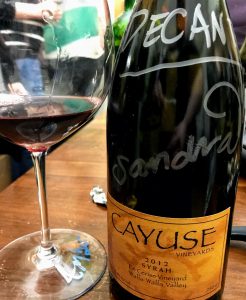
I also have to admire Sandi’s wine picking skills. At my “free-for-all” cellar clean out party last month she nailed it with this 2012 Cayuse En Cerise.
Decanted Podcast (@DecantedPodcast)
Sandi Everingham is one half of this podcasting team that I not only follow on Twitter but subscribe to on Overcast as well. Back in December, I did a review of the Decanted Podcast. What particularly impressed me was how well intuned that Sandi and Dave were in the happenings of the Washington wine scene. That savvy come through in their tweets as well as their podcast.
Liz Barrett (@LizBChicago)
Along with the incredibly charming Odd Bacchus, Liz frequently posts hilarious video wine reviews on a broad range of topics. One recent one that I liked was a blind tasting of musician-related wineries like Sting’s Il Palagio and Constellation Brands’ Dreaming Tree which features Dave Matthews lyrics on its labels.
Diane Roberts (@Positive_Vines)
A Dallas-based blogger, Diane’s posts feature not only great photos and insights from her travels but also a lot of fun stuff about her experiences in the Texas wine and beverage scene.
Drinky LaRue (@Winelover0227)
If you’re looking for the joie de vivre of wine, check out Drinky’s Twitter feed and blog. At its core, wine is about sharing great times and great memories with friends which Drinky does in her posts, retweets and convos. She also brings you to some terrific tasting events she attends that may make you feel a wee bit jealous.
Wine Travel Eats (@winetraveleats)
With her partner David and frequent blog contributor Wendy Baune (@GrnLakeGirl), Amber produces excellent content and gorgeous photos on her Wine Travel Eats and companion sites. She covers a broad spectrum of topics. One recent favorite was her post on Sherry wine.
Leeann Froese (@leeannwine)
As co-owner of Town Hall Brands in Vancouver, British Columbia, Leeann brings a lot of marketing savvy and insights to her posts. She’s one of my go-to sources on what is happening in the BC wine scene.
Thea Dwelle (@Luscious_Lushes)
Thea was an icon at the WBC and it was easy to see why. She has been producing great content on her blog for years which she frequently posts on her Twitter feed–like this recent revisiting on her exploration of the Mencia grape in the Bierzo region of Spain.
Margot Savell (@WriteforWine)
Margot is one of the original Washington wine bloggers that I’ve been following for more than ten years. While she is a fixture in the Washington wine scene, she posts about a variety of wine topic including all the fun discoveries she is currently having on her Australian tour.
US-Focus Bloggers
Kirkland Wine Gal (@kirklandwinegal)
A Pacific Northwest blogger, a lot of Kirkland Wine Gal’s tweets are Washington focused–including this fun Buzzfeed-like quiz from Woodinville Wine Country about “What Woodinville Wine Are You?”. Apparently, I’m Cabernet Sauvignon which will make a handful of readers chuckle.
Amy Lieberfarb (@amylieberfarb)
Amy is a Sonoma-based blogger who gets tagged in many great wine conversations, particularly under the #sonomachat hashtag. These convos feature fun back and forth chats about food and wine pairing as well as some gorgeous photos of wine country life. She also posts and retweets a lot of helpful wine articles.
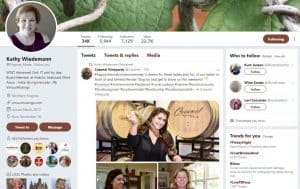
Screenshot of Kathy Wiedemann’s Twitter page.
Kathy Wiedemann (@Virginia_Made)
A passionate advocate for the wines of Virginia, Kathy’s Twitter feed is a great introduction and inspiration to learn more about the wines of Thomas Jefferson’s home state. But even beyond Virginia wine, Kathy is a frequent instigator and contributor to a lot of engaging wine convos including this recent one on Orange wine.
Elaine Schoch (@thecarpetravel)
Elaine is a Denver-based travel writer who runs Carpe Travel. Here she publishes unique content about exciting places including one on the growing New Mexico wine industry.
Jacqueline Coleman (@HistoryandWine)
Jacqueline has another great Twitter handle and her posts often combine her love of history and wine like this recent link to an article on the Coravin blog about the origins of the Grenache grape.
Rupal Shankar (@Syrah_Queen)
Another great Twitter handle but Rupal tweets about more than just Syrah. A recent fav of mine was her post about Nero d’Avola in Sicily.
Nancy Brazil (@MsPullThatCork)
In addition to running her blog, Nancy is a big reader of wine articles from across the globe and posts the best content she finds–including a fantastic piece from Wine Enthusiast about notable first among women in the wine industry.
The Swirling Dervish (@theswirlingderv)
Lauren Walsh is another WSET Diploma student that is a geek after my own heart. Not only does she create great content but I love when she shares tidbits about unique wines she comes across like this white (yes, white!) Cabernet Franc.
Cathie Schafer (@SideHustleWino)
This is another Twitter handle that makes me smile when I see it appear in my news feed. Cathie has a keen eye for interesting wine reviews and photos that she retweets. She also produces fun articles like this recent write-up of the Santa Cruz Pinot noir that Prince Harry and Meghan Markle served at their wedding.
Bloggers Across The Globe
Elena Amigo (@sommenite)
Elena looks to be an Argentine-based sommelier as many of her tweets (often in Spanish) are about wine reviews and producers in Argentina. But she also has a good following list and will often retweet articles from other accounts that I might otherwise miss on my dash.
Steph (@Winellennial)
Steph is a London-based blogger who seeks out and posts lots of great wine news articles. A recent favorite of mine that her feed brought to my attention was a post about winemakers in Chile training dogs on how to sniff out TCA in new corks.
Fran Marshall (@thefoodmarshall)
Fran is an Australian based blogger that brings a great perspective on Southern Hemisphere wines. She’ll post about wines that she’s drinking and retweet fun stuff from wineries she follows like this mesmerizing cascade of Shiraz berries from Clonkilla.
Travelling Corkscrew (@TravelCorkscrew)
Casey at Travelling Corkscrew is an Aussie blogger who I’m glad to be following. This is one of the few ways that I get to learn about all the fantastic, small production Australian wines that rarely make their way to the US. She also brought to my attention the existence of National Drink Wine With Your Cat Week.
Allison Wallace (@allison_wallace)
A Canadian blogger, Allison’s Twitter feed is another terrific source for retweets and links to interesting articles. She’ll also do posts from her blog such as her recent interview with Mari Womack of Damsel Cellars, a fantastic female winemaker from Washington State.
Kirsten MacLeod (@TheKirstenMac)
Kirsten is a WSET Diploma student based in London that takes a global perspective to wine in her tweets and retweets. One article that she recently brought to my dash was Miquel Hudin’s piece on the follies of blind tasting Priorat wines.
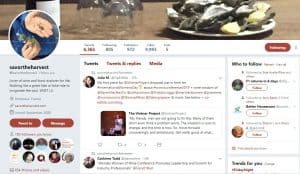
Screenshot of Savor the Harvest’s Twitter page
Savor the Harvest (@savortheharvest)
Lynn, with her partner Mark, is based in Bordeaux and writes about their experiences in one of the benchmark wine regions of the world. In addition to wine, she also post and retweet fun food articles like this interesting piece about cocoa butter.
Jacky Blisson (@JackyBlisson)
Jacky is a Montreal-based MW candidate and wine educator. She posts on a variety of topics, including links to her YouTube wine education channel.
Folks you’re probably already following but are still worth a mention
Lettie Teague (@LettieTeague1) — Wine columnist for the Wall Street Journal.
Ella Lister (@EllaLister) — Founder of Wine Lister.
Maureen Downey (@moevino) — The foremost expert on wine fraud.
Cathrine Todd (@damewine) — At nearly 22,000 tweets and comments, one of the most prolific voices in the Wine Twittersphere.
Kelly Mitchell (@KellyMitchell) — With over 21,500 tweets, the Wine Siren is not that far off either from Dame Wine and contributes quite a bit to the wine convos on Twitter.
Boozychef (@boozychef) — But with almost 250,000 tweets, it is clearly Boozychef’s world and we’re just living in it.
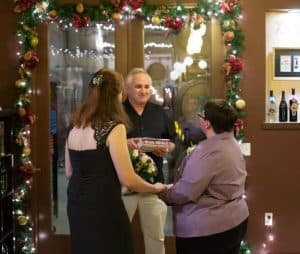
Getting married with the Wine Bible.
Photo by Neil Enns of Dane Creek Photography.
Karen MacNeil (@KarenMacNeilCo) — The author of THE Wine Bible–which I actually got married with. Seriously!
Meg Maker (@megmaker) — Founder of the Terroir Review.
Tia Butts (@WineInkByTia) — Napa-based wine communicator and host of Farmers Fresh Hour on KVON 1440 am
Fiona Beckett (@winematcher) — Decanter contributor and host of the Batonnage podcast.
Natalie MacLean (@NatalieMacLean) — Longtime wine pro and manager of her eponymous site.
Joanie Metivier (@Joaniemetivier) — Creator of the Wine Regions Coloring Book.
Amy Corron Power (@WineWonkette) — Photojournalist and editor of Another Wine Blog.
Leslie Sbrocco (@lesliesbrocco) — Bay Area-based wine communicator featured on many television shows and publications.
Wine Harlots (@WineHarlots) — A wine site with a humous bent run by Nannette Eaton.
Alice Feiring (@alicefeiring) — Leading Natural Wine advocate and author of numerous wine books.
Elizabeth Schneider (@NormalWine) — Host of the Wine for Normal People podcast which I review here.
Lisa Perrotti-Brown (@LisaPBMW) — Editor-in-chief of Robert Parker’s Wine Advocate.
Madeline Puckette (@WineFolly) — Founder of the wine education site Wine Folly.


